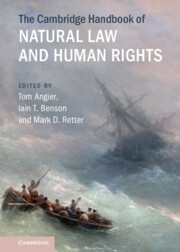Book contents
- The Cambridge Handbook of Natural Law and Human Rights
- The Cambridge Handbook of Natural Law and Human Rights
- Copyright page
- Contents
- Contributors
- Acknowledgements
- Introduction
- Part I Natural Law and the Origins of Human Rights
- Part II Natural Law Foundations of Human Rights Obligations
- Part III Natural Law and Human Rights within Religious Traditions
- Part IV The Human Person, Political Community, and Rule of Law
- Part V Rival Interpretations and Interpretive Principles
- 24 Moral Pluralism, Political Disagreement, and Human Rights
- 25 Human Rights Law and Adjudication
- 26 Natural Law and Human Rights amid the Legal Ruins of Liberal Scepticism, Values Language, and Global Resets
- 27 Human Rights and the Modes of Judicial Responsibility
- 28 The Right to Religious Freedom
- 29 Natural Law, Rights of the Family, and International Human Rights Instruments
- 30 Natural Law and Socioeconomic Rights
- 31 Solidarity and Global Allocation of COVID-19 Vaccines
- Part VI Challenges and Future Prospects
- Index
30 - Natural Law and Socioeconomic Rights
from Part V - Rival Interpretations and Interpretive Principles
Published online by Cambridge University Press: 03 November 2022
- The Cambridge Handbook of Natural Law and Human Rights
- The Cambridge Handbook of Natural Law and Human Rights
- Copyright page
- Contents
- Contributors
- Acknowledgements
- Introduction
- Part I Natural Law and the Origins of Human Rights
- Part II Natural Law Foundations of Human Rights Obligations
- Part III Natural Law and Human Rights within Religious Traditions
- Part IV The Human Person, Political Community, and Rule of Law
- Part V Rival Interpretations and Interpretive Principles
- 24 Moral Pluralism, Political Disagreement, and Human Rights
- 25 Human Rights Law and Adjudication
- 26 Natural Law and Human Rights amid the Legal Ruins of Liberal Scepticism, Values Language, and Global Resets
- 27 Human Rights and the Modes of Judicial Responsibility
- 28 The Right to Religious Freedom
- 29 Natural Law, Rights of the Family, and International Human Rights Instruments
- 30 Natural Law and Socioeconomic Rights
- 31 Solidarity and Global Allocation of COVID-19 Vaccines
- Part VI Challenges and Future Prospects
- Index
Summary
Contemporary thought on human rights is rooted in significant part in the soil of natural law theory. Some natural law theorists embrace the idea of enforceable rights to a range of desirable socioeconomic outcomes. But natural law theory is best understood as grounding rights that foster these outcomes indirectly. Such rights, as I envision them, qualify as socioeconomic rights because they directly concern the socioeconomic sphere and because they further those aspects of flourishing which alternative schemes of socioeconomic rights are often intended to protect. There is, I suggest, a plausible natural law case to be made for indirectly promoting these dimensions of well-being by enforcing legal rights to bodily integrity, property, and labor, and so accepting robust limits on the use of force. In this chapter, I lay the groundwork for an exploration of that case by elaborating the variety of natural law theory in which I seek to ground my understanding of socioeconomic rights. I go on to discuss norms germane to the institutional context of socioeconomic life and to propose a set of fundamental socioeconomic rights and briefly consider the significance of these rights.
Keywords
- Type
- Chapter
- Information
- The Cambridge Handbook of Natural Law and Human Rights , pp. 448 - 464Publisher: Cambridge University PressPrint publication year: 2022



